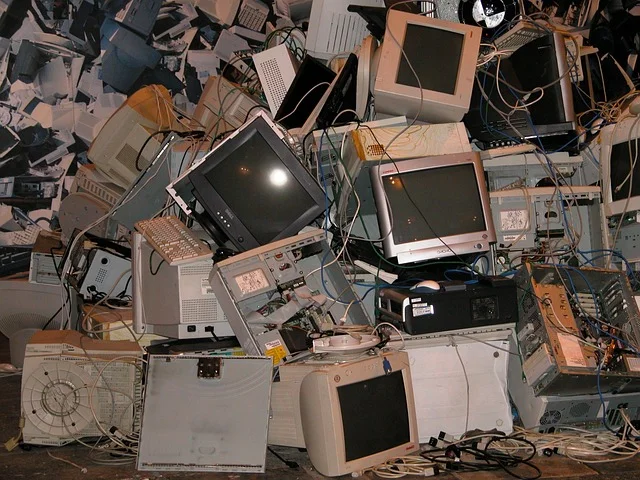Recycling electronics is important for both environmental protection and resource conservation. And if you’re looking to recycle electronics In Austin, Texas, there are several options for you to do that responsibly.
In Austin, the easiest way to recycle electronics is to schedule an e-waste curbside pickup with Austin Resource Recovery via the Austin Recycles app or by calling 3-1-1, or drop off items at the Recycle & Reuse Drop-off Center.
Let’s get into the nitty gritty of electronics recycling in Austin, TX!
Does Austin Have A Recycling Program?

Austin has a comprehensive recycling program managed by Austin Resource Recovery, a city service dedicated to waste management and recycling for Austin residents. This program provides curbside collection of recyclables for single-family homes as part of its efforts to reach Zero Waste by 2040, aiming to reduce the amount of trash sent to landfills by 90%.
Residents can use their blue recycling carts to recycle a variety of materials including paper, cardboard, glass, and certain plastics and metals.
For electronics, which require special handling due to hazardous materials they may contain, Austin Resource Recovery offers additional services. Residents must schedule a collection for their electronics, which can be done through the Austin Recycles app or by contacting Austin 3-1-1.
Additionally, the city hosts collection events and supports a Recycle & Reuse Drop-off Center, where people can bring their electronic waste and other recyclables. This reflects Austin’s commitment to sustainable waste management and resource conservation within the city.
How to Recycle Electronics in Austin
Recycling electronics in Austin can be done responsibly and conveniently if you know the correct avenues to pursue.
Here is a more detailed guide on how to go about it:
- Curbside Collection by Austin Resource Recovery:
- Scheduling: You can use the Austin Recycles app or call Austin 3-1-1 to schedule a pick-up for your electronics.
- Preparation: Place your electronics at the curb by 6:30 a.m. on the day of collection but no earlier than 6:30 p.m. the day before.
- Limitations: There may be a limit on the number of items you can leave out, and certain items like large appliances or TVs may have special instructions or restrictions.
- Recycling Drop-Off Center:
- Location: The Recycle & Reuse Drop-off Center is a facility where you can bring various household waste including electronics.
- Documentation: Proof of residency in Austin is typically required to use this facility.
- Accepted Items: Check the current list of accepted items as it can change. Generally, items like computers, printers, phones, and other small electronics are accepted.
- Special Recycling Events:
- Eco Events: Austin Resource Recovery and other community organizations periodically host events dedicated to recycling specific items, including electronics.
- Awareness: Keep an eye on local listings, the city website, or community bulletin boards for upcoming events.
- Retailer and Manufacturer Programs:
- In-Store Recycling: Stores like Best Buy, Staples, and Office Depot often accept electronics for recycling. They may take items like batteries, ink cartridges, and small electronics.
- Manufacturer Take-Back: Many electronics manufacturers offer recycling programs for their own products, sometimes in exchange for a voucher or discount on future purchases.
- Private E-Waste Recyclers:
- Certified E-Waste Recyclers: Look for facilities certified by e-Stewards or R2, which adhere to high standards of environmental responsibility and worker safety.
- Services: Some of these recyclers may offer pick-up services for large quantities of e-waste, useful for businesses or large-scale cleanouts.
- Selling or Donating:
- Online Marketplaces: If your electronics are still usable, selling them or giving them away through platforms like Craigslist, Nextdoor, or Facebook Marketplace can be a form of recycling that extends the life of the product.
- Donation Centers: Goodwill, Salvation Army, and local schools or non-profits may accept working electronics.
Austin’s programs are designed to be user-friendly and accessible, encouraging all residents to participate in the preservation of the environment.
Other Options for Electronics Recycling in Austin
Apart from municipal services, Austin residents can explore various other channels for recycling their electronic devices responsibly:
- Manufacturer Take-Back Programs: Many electronics manufacturers have programs to take back old products when customers purchase new ones. Companies like Dell, HP, and Apple provide mail-back services or drop-off locations for their products.
- Retail Recycling Programs: Retailers such as Best Buy and Staples often offer recycling for a wide range of electronics, sometimes offering store credit as an incentive.
- Donation to Nonprofits: Organizations like Goodwill and the Salvation Army accept working electronics, which they refurbish and sell, with proceeds going to charity.
- Online Marketplaces: Websites such as eBay and Craigslist can be used to sell or even give away functional electronics to others who may need them.
- Local E-Waste Recyclers: Independent e-waste recycling companies may offer services for electronics recycling, sometimes with the convenience of pickup services for large items or bulk quantities.
- Community E-Cycling Events: Keep an eye out for e-cycling drives and events hosted by local schools, churches, or community groups, which often partner with certified recyclers.
Electronics That Are Typically Accepted in Recycling Programs
Most electronics recycling programs will accept a range of devices, including, but not limited to:
- Computers: Desktops, laptops, servers, and their components like hard drives, RAM, and power supplies.
- Computer Peripherals: Keyboards, mice, speakers, and webcams.
- Mobile Devices: Smartphones, tablets, e-readers, and MP3 players.
- Entertainment Electronics: Televisions, DVD players, video game consoles, and stereo equipment.
- Office Equipment: Printers, fax machines, copiers, and scanners.
- Small Home Appliances: Microwaves, toasters, blenders without batteries.
- Batteries and Power Supplies: Rechargeable batteries and uninterruptible power supplies (UPS).
- Cables and Chargers: All types of power cords, cables, and associated hardware.
- Media: CDs, DVDs, and Blu-ray discs, although these are less commonly accepted.
Each recycling program has its own specific guidelines on what is and isn’t accepted, and some items may require special handling or fees.
It’s always a good idea to check with the specific program or facility for their current list of accepted items and any preparatory steps you need to take before recycling your electronics.
Can You Recycle Electronics for Cash in Austin?
But what if you’re hoping to add a bit of extra cash, and not just turn over your electronics free of charge, are there any ways you can get paid for it instead?
In general, recycling electronics for cash is not common through municipal programs. However, there may be private recycling companies or electronics retailers that offer cash or store credit for old electronics. For instance, some stores may offer a trade-in program where you can get a discount on a new purchase or a gift card in exchange for your old device.
So while it’s not a common occurrence, there are ways you can get some value out of your old electronics junk.

I’m Thomas, the owner of SustainableWave. Passionately promoting a sustainable planet. With experience in various eco-roles, I’ll share green tips, sustainability hacks, and personal eco-journeys on my blog.






